Use controls above or click here to open this Hometown Heroes podcast in a new window
96-year-old Bill Roche of Colorado Springs, CO appears on episode #686 of Hometown Heroes, airing June 19-24, 2021.
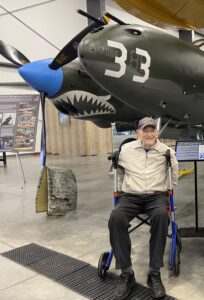
This episode was recorded at the National Museum of World War II Aviation in Colorado Springs, where World War II veterans always receive free admission. Not only did Bill survive nine missions – and two crash landings – as a B-17 waist gunner with the 452nd Bomb Group, but he would go on to an Air Force career that spanned 33 years and saw him retire with the rank of Colonel. Bill’s adventures included the distinction of becoming the United States Air Force Academy’s first Russian language instructor, as well as years of clandestine service during the Cold War for both the military and the CIA. His earliest memories came in Lexington, KY, where he graduated from Lexington Latin School at the age of 15.
“They concentrated on Latin and Greek, German, and I had a lot of languages,” you’ll hear him say of that all boys school with a 1940 graduating class of eight. “I guess that’s the reason I ended up teaching Russian.”
One of five children in the Roche family, Bill worked as a civilian at the Lexington Army Signal Depot until he was old enough to follow in the footsteps of his older brother, who had joined the Army Air Corps after the bombing of Pearl Harbor.
“Patriotism in those days was a real thing,” you’ll hear Roche remember. “I mean they were really patriotic and wanted to get into it when they found out that we’d been attacked.”
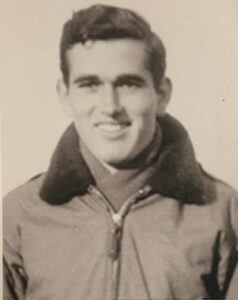
Bill’s ambition of becoming a pilot took him through a humid, sweaty summer in Biloxi, MS, into four months of college training at Elon College in North Carolina, and then to Nashville, TN, where fifty cadets expected to be classified as either pilots, navigators, or bombardiers. The heavy casualties absorbed by the 8th Air Force in Europe necessitated a change of plans.
“Every time they lost a B-17 they lost two pilots,” you’ll hear Roche explain. “But they lost 5 gunners, so they needed gunners and they washed us out. We never got a chance to get into flying school.”
42 of the 50 cadets, including Roche, were assigned as gunners, and for Bill that meant a trip to Buckley Field near Denver for armament school. Well known actor John Payne was one of his instructors there, as was Danny Murtaugh, who had interrupted his Major League Baseball career to serve our country, and ended up fighting in Europe with the 97th Infantry Division. Gunnery school in Florida followed for Bill, who trained there for aerial gunnery by standing in the back of a moving truck and firing at skeet that could be launched in any direction at any time. Soon, he was introduced to his bomber crew and they trained in B-17s.
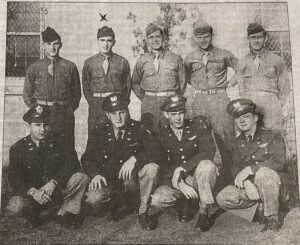
With brief stopovers in Georgia and New Jersey, Roche finally headed overseas in November, 1944, the SS Ile de France carrying them on a ten-day voyage to England, where his crew was assigned to the 452nd Bomb Group at Deopham Green. You’ll hear Bill relate why their first mission as a crew was delayed, and share some of the challenges they would face once their combat time commenced. While flak would prove a more ever present hazard than fighters, virtually all the enemy fighters Roche encountered were Me-262 jets.
“We didn’t have a chance,” you’ll hear him say of trying to hit Me-262s with his waist gun. “They zipped through the formation so fast, you could barely identify what they were.”
Anti-aircraft artillery was always a threat. You’ll hear Roche recall one mission that left over 100 holes in the aircraft, and you’ll hear his recollections of the February 6, 1945 mission that ended with a crash landing in a field in France.
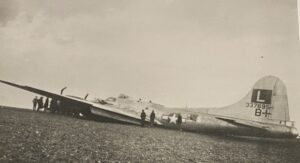
Flak cost the bomber the use of one engine, and an inexperienced navigator was unable to direct them to the friendly airfield they hoped to find in Brussels, Belgium. Instead, after jettisoning everything they could in an effort to buy additional time, they were forced to attempt a crash landing near Orleans, France. The plane’s electrical system had been shot out, so the flight engineer was forced to manually operate the flaps as pilot Allen Marksian tried to bring the crippled bomber down safely. Marksian had given the crew the option of bailing out, but by unanimous vote, they decided to trust their pilot. Touching down on the upward slope of a hill, the plane skidded to a stop, with mud cascading into the fuselage through the hole where the discarded ball turret had been.
“We thought we were still in Germany. We saw some people coming across the field,” Roche recalls, noting that his waist gun would be their only means of defense. “They turned out to be French farmers.”
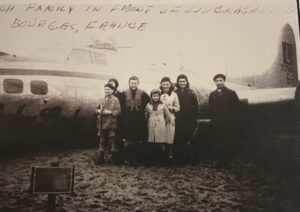
While the pilot, co-pilot, and engineer attended a wedding and stayed in nearby homes, Bill and the rest of the crew spent the next few nights sleeping inside the airplane. 58 years later, he returned to the scene of the crash, and was honored by the French government, but less than three weeks after surviving that crash landing, he had to endure another. On February 26, 1945, a mission to heavily defended Berlin, saw their B-17 “Flatbush Floogie” damaged by enemy fire.
This time, their emergency landing would come in Soviet-occupied Poland, deploying the landing gear with the hopes that friendly Russian forces would be able to help repair the bomber and send them back on their way. Just in case, the crew exited the plane with their hands up, making sure the Soviets knew they were not a threat.
“We thought we’d get out of there, that was the pilot’s idea,” you’ll hear Bill remember. “They sent a Russian mechanic, but he wasn’t going to get us out of there because they wanted that B-17.”
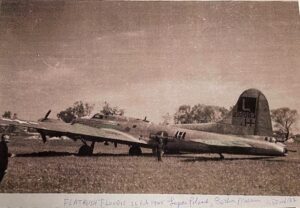
Within a couple days, the Americans were no longer allowed access to their plane, and on April 1, 1945, their situation took a decided turn for the worse. They had been invited to Easter dinner with a Polish family, and were quite excited at the prospect of that celebratory feast. Instead they fell victim to a deceptive scheme. Told that a plane had been made available to fly them back to England, they were taken to an airfield in the vicinity of Krakow.
“That’s when they locked us up,” Roche explains. “They took our weapons, they took everything. Locked us up in this brick building out at this airfield.”
Bill would spend the better part of the next held captive by Soviet forces. Transported to the Ukraine, he endured circumstances that became progressively worse. Listen to Hometown Heroes for the unusual source of nutrition he was enjoying until the lights came on and revealed what it happened to be. On April 28th, 1945, Roche tasted freedom again, exchanged back into American hands in Odessa, Ukraine. By July of 1945, he had returned home to the U.S. aboard the Queen Mary. Watch the short video below for more of Bill’s perspective on life as a prisoner of war:
After returning home, Bill attended the University of Kentucky, earning an ROTC commission back into what was now the U.S. Air Force. His nearly 33 years in uniform included teaching Russian at the U.S. Air Force Academy, Air Attache deployments in Yugoslavia, Czechoslovakia, and the Soviet Union, as well as other intelligence assignments that you’ll hear him reference in the podcast version of this episode. We know we could fill several more episodes with stories from his clandestine career during the Cold War – which included 10 more years with the CIA after retiring from the Air Force as a colonel – but many of those exploits remain classified. Thanks to Bill for his service to our country that can be discussed, as well as his contributions that can’t, and thanks to Mark Schaefer of Honor Flight of Southern Colorado for introducing us to this amazing American.
—Paul Loeffler

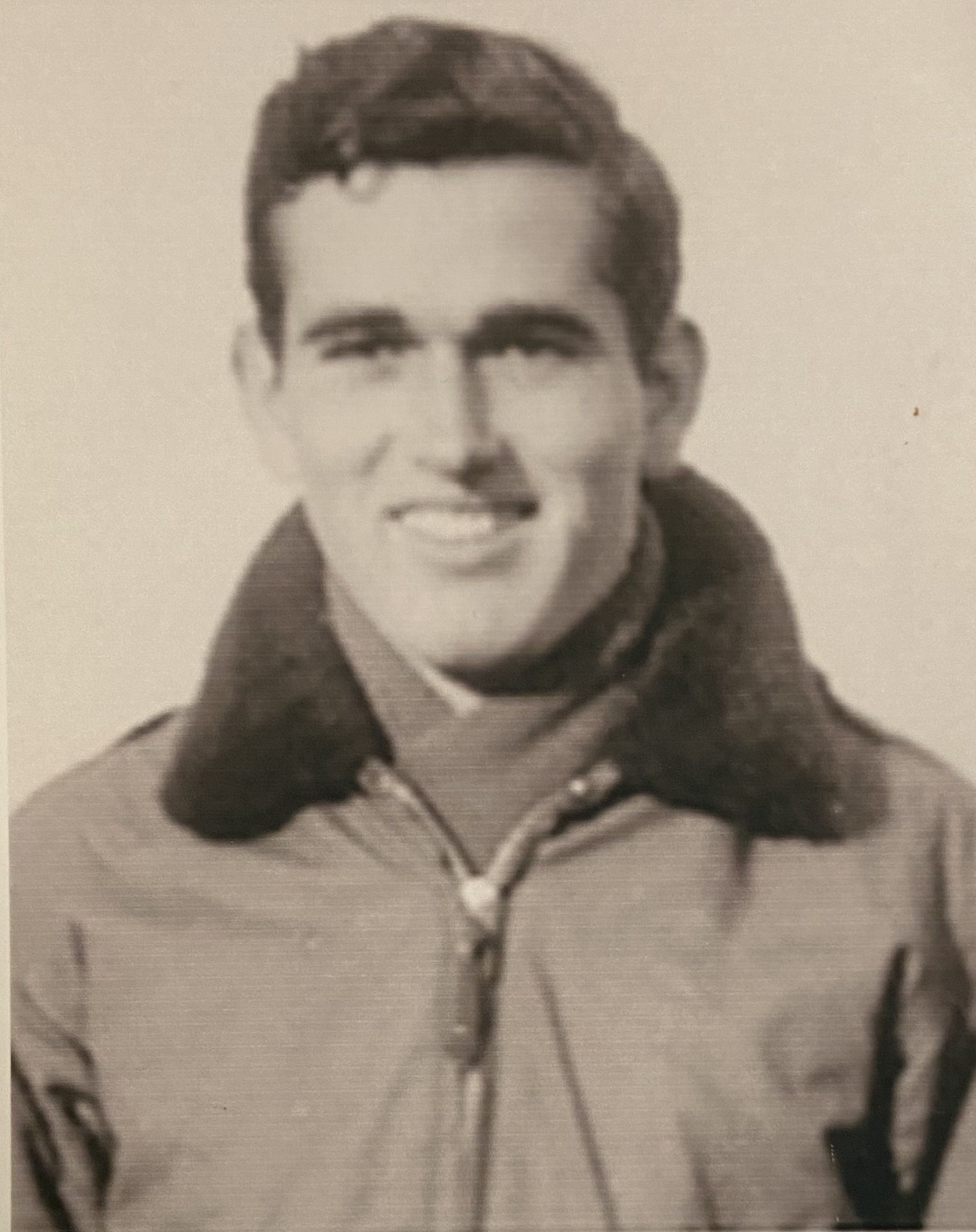
Leave a Reply